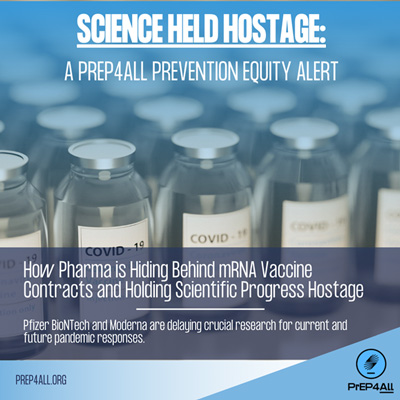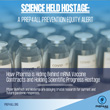Science Held Hostage: PrEP4All Exposes Big Pharma's Efforts to Delay Innovative, Lifesaving COVID-19 Research in Investigative Report

New York, NY - April 18, 2023 - The Biden Administration's "Project Next Gen" initiative for new pandemic-focused vaccines and treatments could be delayed by months or even years by pharmaceutical companies that will not make current SARS CoV-2 vaccines readily available for pre-clinical and clinical research, according to PrEP4All. This is the conclusion from the advocacy organization's new report, released today, titled "Science Held Hostage: How Pharma is Using mRNA Vaccine Contracts With Government to Delay Future Innovation." The publication details how pharmaceutical companies are using language from contracts inked in the earliest days of the pandemic as an excuse for delaying access to their vaccines. The report also reveals that US government funding is being used to purchase generic versions of Pfizer's mRNA vaccine for use in pre-clinical research.
"Around the world, governments signed contracts with industry during the early days of the COVID-19 pandemic that reflected entirely appropriate precaution and safeguards for public health actors, including industry, in a crisis context," said Emily Bass, Senior Policy Advisor for PrEP4All and lead author on the report. "However there is no excuse and no basis for companies using these contracts to delay and derail future innovation."
"Science Held Hostage" reflects a six-month long investigation of the causes and extent of a straightforward problem: current SARS CoV-2 vaccines are needed for scientific progress. Many potential recipients of any newly developed product have already been vaccinated against previous variants of SARS CoV-2. In order to evaluate these new products, they need to be tested in animal models that include prior immunization. However, scientists in the United States have faced enormous obstacles obtaining vaccines needed for animal studies.
As the report explains, government contracts reflect regulatory authorities' provisions for use of the vaccines which, compared to previous vaccines, were developed in record time for SARS CoV-2. In the US this is the Food and Drug Administration's Emergency Use Authorization. This EUA for each vaccine specifically restricts usage of vaccines to children and adults in the United States. Other uses, such as research in humans and/or non-human animal models are not included in the EUA. Comparable language exists in other government contracts with industry.
At present, governments must negotiate with pharma about use of government-owned doses for both donations and research purposes. PrEP4All reports that government officials say that pharma companies are at liberty to make vaccines that the companies own available for research. While there are regulatory systems in place that would support the safe and ethical use of industry-owned vaccines for research purposes, the research groups interviewed for this report stated that they could not easily obtain these doses from industry without also granting the company intellectual property claims on the product under development. Such a concession should not be required. There is no excuse for companies to use these contracts to delay and derail future innovation.
Unable to procure Pfizer and/or Moderna mRNA vaccines, researchers have been forced to source used vials with leftover doses or doses at or near expiry from hospitals and health departments, or to purchase the components of Pfizer-like vaccines from a small US-based company, as described in the report. "Research groups supported by the same US taxpayer dollars that paid for Operation Warp Speed are paying for generic versions of these vaccines in order to advance the science. We're being double-charged at a time when funding for crucial work to prevent the next pandemic is in short supply," said Jeremiah Johnson, PrEP4All Executive Director.
PrEP4All asserts that barriers preventing researchers from accessing vaccines are imminently solvable. In the short term, companies like Pfizer-BioNTech and Moderna must make vaccine doses available for clinical trials through a simple, transparent independent investigator application process that does not require investigators to share intellectual property with the vaccine manufacturer. Meanwhile, governments must expedite permissions to use mRNA vaccines for research, especially when the government has patent rights or provided significant funding for the vaccine. PrEP4All demands institutions like the World Health Organization, Gavi, COVAX, and governments develop best practices for procurement during health emergencies, including language for procurement contracts for research on existing and next generation products.
"This is an eminently solvable problem that needs to be addressed now, before the next crisis occurs," Emily Bass said. "While this report focuses on the US context, the problem is global. Without action now, the research needed to prepare for future pandemics will be dangerously delayed."
This report is the first edition of PrEP4All's new Prevention Equity Alert series of in-depth investigations and analyses of issues related to health justice, pandemics and infectious disease threats that disproportionately impact queer, vulnerable and marginalized communities.




